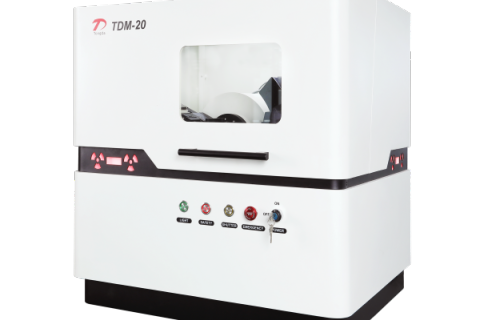
- Home
- >
News
The TDM-20 X-ray Diffractometer (Benchtop XRD) is primarily used for phase analysis of powders, solids, and paste-like substances. Based on the principle of X-ray diffraction, it enables qualitative and quantitative analysis, as well as crystal structure analysis, of polycrystalline materials like powdered samples and metal samples. It is widely applied in industries including industry, agriculture, national defense, pharmaceuticals, mineralogy, food safety, petroleum, and education/research. Core Principle: X-ray Diffraction, the Key to the Microscopic World The TDM-20 X-ray Diffractometer operates on the principle of X-ray diffraction. When X-rays illuminate a sample, they interact with the atoms in the sample and diffract. Different crystal structures produce unique diffraction patterns, much like individual fingerprints. By analyzing these patterns, the instrument precisely reveals key information about the sample's crystal structure, phase composition, and more, uncovering the secrets hidden at the microscopic level. Performance Breakthrough The TDM-20 X-ray Diffractometer (Benchtop XRD) surpasses the previous international standard of 600W, undergoing a comprehensive upgrade to 1200W. The instrument features simple operation, stable performance, and low energy consumption. It can be equipped with either a proportional detector or a new high-speed array detector, resulting in a significant leap in overall performance. Device Features Compact size and lightweight design High-frequency, high-voltage power supply design for lower overall energy consumption Supports rapid sample calibration and testing Simplified circuit control for easy debugging and installation Full-spectrum diffraction angle linear accuracy reaches ±0.01° Rich Accessories The TDM-20 can be paired with various accessories, including a 1D array detector, proportional detector, 6-position automatic sample changer, rotating sample stage, among others. Conclusion The TDM-20 X-ray Diffractometer (Benchtop XRD) , with its outstanding performance, user-friendly operation, and broad range of applications, has become an indispensable tool across numerous industries and research fields. It acts like a "detective" of the microscopic world, helping us unravel the mysteries of material structure and driving progress in various domains. If you too seek to delve deeper into the microscopic secrets of matter, consider the TDM-20 to embark on a journey of precise and efficient research and production.
The TDM-20 high-power X-ray diffractometer(Benchtop XRD)is mainly used for phase analysis of powders, solids, and similar paste materials. The principle of X-ray diffraction can be used for qualitative or quantitative analysis, crystal structure analysis, and other polycrystalline materials such as powder samples and metal samples. Benchtop XRD is widely used in industries such as industry, agriculture, national defense, pharmaceuticals, minerals, food safety, petroleum, education, and scientific research. 1、Core features of TDM-20 benchtop X-ray diffractometer(Benchtop XRD): The loading of the new high-performance array detector has greatly improved the overall performance of the device, with a small size and light weight; The whole machine is integrated into the desktop size (usually ≤ 1m³), saving space and suitable for small laboratories or teaching environments;The working power of high-frequency and high-voltage power supply can reach 1600W; Quick analysis, able to calibrate and test samples quickly; By using high-performance detectors (such as two-dimensional detectors) and optimizing the optical path, sample scanning can be completed in a few minutes; Simple circuit control, easy to debug and install; The angle repeatability can reach 0.0001; Low power consumption and safety, using low-power X-ray tubes (such as ≤ 50W), equipped with multiple radiation protection, no need for special shielding rooms; User friendly, equipped with automation software, supporting one click operation, real-time data visualization, and standard database (such as ICDD PDF) comparison. 2. Typical application scenarios of TDM-20 benchtop X-ray diffractometer(Benchtop XRD): Materials Science of X-ray diffractometer(Benchtop XRD): Rapid identification of crystal structure and phase composition (such as metals, ceramics, polymers). Materials Science of X-ray diffractometer(Benchtop XRD): Industrial site testing of the crystal purity of raw materials or finished products (such as pharmaceuticals and battery materials). Materials Science of X-ray diffractometer(Benchtop XRD): Undergraduate experimental teaching, visually demonstrating the Bragg diffraction principle. Materials Science of X-ray diffractometer(Benchtop XRD): Mineral composition analysis of cultural relics or preliminary screening of field samples. 3.Technical parameters of TDM-20 benchtop X-ray diffractometer(Benchtop XRD): Project : parameter range X-ray source:Cu target (λ=1.54 Å), Mo target optional Voltage/current:10-50 kV/0.1-2 mA Angle measuring instrument range:0-90 ° 2θ (some models can be extended) Angle resolution:≤ 0.01 ° Detector type: one-dimensional linear or two-dimensional surface detector Sample size: Powder (milligrams), film or block 4.Advantages and limitations of TDM-20 benchtop X-ray diffractometer(Benchtop XRD): Advantages: Low cost (about 1/3-1/2 of large XRD), easy maintenance. Support non-destructive analysis and simple sample preparation (such as directly placing powder). limitations: The resolution and sensitivity are slightly lower than high-end devices, and may not be suitable for ultra-fine structural analysis. Extreme condition testing (such as high-temperature/high-pressure in-situ experiments) is usually not feasible.
The TDM-20 Benchtop X-ray diffractometer uses a new high-performance array detector, and the loading of this detector has greatly improved the overall performance of the machine. The TDM-20 Benchtop XRD is mainly used for phase analysis of powders, solids, and similar paste like materials. The TDM-20 Benchtop X-ray diffractometer utilizes the principle of X-ray diffraction to perform qualitative or quantitative analysis, crystal structure analysis, and other polycrystalline materials such as powder samples and metal samples. Benchtop XRD is widely used in industries such as industry, agriculture, national defense, pharmaceuticals, minerals, food safety, petroleum, education, and scientific research.
The TDM-20 high-power X-ray diffractometer (benchtop XRD) is mainly used for phase analysis of powders, solids, and similar paste like materials. The principle of X-ray diffraction can be used for qualitative or quantitative analysis, crystal structure analysis, and other polycrystalline materials such as powder samples and metal samples. It is widely used in industries such as industry, agriculture, national defense, pharmaceuticals, minerals, food safety, petroleum, education, and scientific research.
The TDM-20 X-ray diffractometer is mainly used for phase analysis of powders, solids, and similar paste like materials. The X-ray diffractometer can be used for qualitative or quantitative analysis, crystal structure analysis, and other polycrystalline materials such as powder samples and metal samples. X-ray diffractometer is widely used in industries such as industry, agriculture, national defense, pharmaceuticals, minerals, food safety, petroleum, education, and scientific research. Benchtop XRD is an experimental equipment used for analyzing the crystal structure of materials. Benchtop XRD determines the crystal structure, lattice parameters, and phase composition of the material by emitting X-rays and measuring the diffraction angle and intensity after their interaction with the sample.
The TDM-20 desktop X-ray diffractometer is mainly used for phase analysis of powders, solids, and similar paste like materials.Benchtop XRD utilizes the principle of X-ray diffractometer to perform qualitative or quantitative analysis, crystal structure analysis, and other polycrystalline materials such as powder samples and metal samples. The TDM-20 desktop X-ray diffractometer is widely used in industries such as industry, agriculture, national defense, pharmaceuticals, minerals, food safety, petroleum, education, and scientific research. The loading of a new high-performance array detector has led to a significant improvement in the performance of benchtop XRD。 Benchtop XRD equipment has a small volume and light weight; The working power of the Benchtop XRD high-voltage power supply can reach 1600 watts; Benchtop XRD can quickly calibrate and test samples; Benchtop XRD circuit control is simple and easy to debug and install; The repeatability of the Benchtop XRD angle can reach 0.0001.






